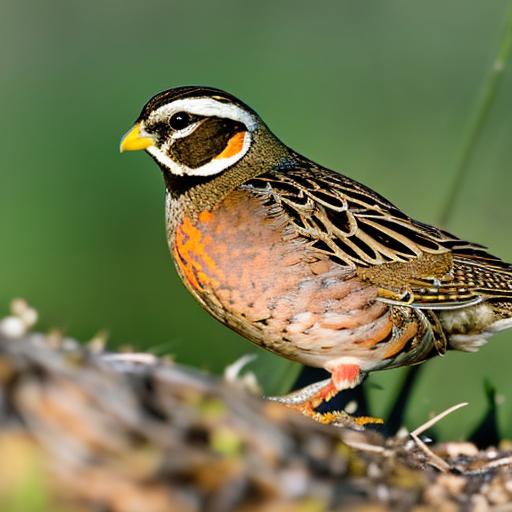Keeping quail indoors can be a rewarding and enjoyable experience for bird enthusiasts. Quail are small, ground-dwelling birds that are known for their gentle nature and unique vocalizations. While they are often kept in outdoor aviaries or on farms, keeping quail indoors can be a great option for those who live in urban areas or have limited outdoor space. Indoor quail keeping allows for close observation of these fascinating birds and provides an opportunity to create a naturalistic habitat within the home. With the right knowledge and preparation, indoor quail keeping can be a fulfilling hobby that brings joy and entertainment to both the birds and their caretakers.
Key Takeaways
- Keeping quail indoors can be a rewarding and convenient way to raise these birds for eggs, meat, or companionship.
- Quail have specific needs for space, temperature, and diet that must be met in an indoor environment to ensure their health and well-being.
- Setting up an indoor quail habitat requires careful consideration of cage size, bedding, lighting, and ventilation to create a comfortable and safe living space for the birds.
- Feeding and caring for indoor quail involves providing a balanced diet, clean water, and regular monitoring for signs of illness or stress.
- Potential challenges of keeping quail indoors include noise, odor, and the need for regular cleaning and maintenance, but the benefits of convenience, control, and companionship can outweigh these challenges for many enthusiasts.
Understanding the Needs of Quail
Before embarking on the journey of keeping quail indoors, it is important to understand the specific needs of these birds. Quail require a habitat that mimics their natural environment, with access to suitable food, water, shelter, and space to move around. They are social animals and thrive in small flocks, so it is recommended to keep at least two or three quail together to prevent loneliness and stress. Quail also need access to dust baths to keep their feathers clean and healthy, as well as perches or platforms to roost on. Additionally, they require a balanced diet that includes a mix of commercial quail feed, fresh greens, and occasional treats such as mealworms or fruits. Understanding the needs of quail is essential for creating a comfortable and enriching indoor habitat for these birds.
Setting Up an Indoor Quail Habitat
Creating a suitable indoor habitat for quail requires careful planning and consideration of their specific needs. The first step is to choose an appropriate enclosure, such as a large cage or a custom-built aviary, that provides enough space for the quail to move around and engage in natural behaviors. The enclosure should be lined with a soft bedding material, such as straw or wood shavings, to provide a comfortable surface for the quail to walk and rest on. It is important to include hiding spots and shelters within the enclosure, such as small boxes or tunnels, to give the quail a sense of security and privacy.
In addition to the physical enclosure, it is essential to provide the quail with access to natural light and fresh air. Placing the enclosure near a window or using full-spectrum lighting can help simulate natural daylight and support the birds’ circadian rhythms. Adequate ventilation is also crucial for maintaining good air quality within the indoor habitat. Finally, it is important to consider the temperature and humidity levels within the indoor quail habitat, as quail are sensitive to extreme heat or cold. Using a thermometer and hygrometer can help monitor these environmental factors and make any necessary adjustments to ensure the quail’s comfort and well-being.
Feeding and Caring for Indoor Quail
Feeding and caring for indoor quail requires attention to their dietary needs and daily care routines. Quail should have access to a high-quality commercial quail feed that is specifically formulated to meet their nutritional requirements. Additionally, they should be offered fresh greens, vegetables, and fruits as part of a balanced diet. It is important to provide clean water at all times, using a shallow dish or waterer that is easily accessible to the quail.
In terms of daily care, indoor quail habitats should be cleaned regularly to maintain hygiene and prevent the buildup of waste and debris. This includes removing soiled bedding, refreshing food and water supplies, and sanitizing the enclosure as needed. Quail also benefit from regular interaction and socialization with their caretakers, which can help reduce stress and promote positive behavior. Observing the quail’s behavior and health on a daily basis is important for detecting any signs of illness or distress early on.
Potential Challenges of Keeping Quail Indoors
While keeping quail indoors can be a rewarding experience, it also comes with its own set of challenges. One potential challenge is managing the noise level, as quail are known for their distinctive calls and vocalizations. Careful consideration should be given to the placement of the indoor quail habitat to minimize noise disturbance to household members or neighbors.
Another challenge is maintaining a clean and odor-free environment within the indoor habitat. Quail produce waste regularly, so it is important to stay on top of cleaning and sanitation to prevent unpleasant odors and potential health issues for the birds. Additionally, providing adequate ventilation and air circulation can help mitigate any potential odor problems.
Finally, ensuring the safety and security of the indoor quail habitat is essential for preventing escapes or predator attacks. The enclosure should be secure and escape-proof, with no gaps or openings that could allow the quail to get out or predators to get in. It is also important to be mindful of potential household hazards, such as toxic plants or chemicals, that could pose a risk to the quail’s health.
Benefits of Keeping Quail Indoors
Despite the potential challenges, there are numerous benefits to keeping quail indoors. One of the main advantages is the ability to closely observe and interact with these fascinating birds on a daily basis. Indoor quail keeping allows for a deeper understanding of their behavior, social dynamics, and individual personalities.
Additionally, keeping quail indoors provides a unique opportunity to create a naturalistic and enriching environment within the home. Caretakers can design the indoor habitat with features such as live plants, natural perches, and hiding spots to promote the quail’s physical and mental well-being. This can be a fulfilling creative outlet for bird enthusiasts who enjoy designing and maintaining beautiful living spaces for their pets.
Furthermore, indoor quail keeping can be a great educational experience for families with children or individuals interested in learning more about avian care. It offers an opportunity to teach responsibility, empathy, and respect for animals while fostering a sense of connection with nature.
Conclusion and Final Considerations

In conclusion, keeping quail indoors can be a rewarding endeavor for bird enthusiasts who are willing to invest time, effort, and resources into creating a suitable habitat for these charming birds. Understanding the needs of quail, setting up an appropriate indoor habitat, providing proper care and nutrition, and addressing potential challenges are all essential aspects of successful indoor quail keeping.
Before embarking on this journey, it is important to research thoroughly and seek advice from experienced quail keepers or avian professionals. It is also crucial to check local regulations and ordinances regarding keeping quail as pets in indoor settings.
Ultimately, indoor quail keeping can bring joy, companionship, and a deeper appreciation for nature into the home. With proper planning and dedication, it is possible to create a safe, comfortable, and enriching environment for these delightful birds within an indoor setting.
If you’re considering keeping quail indoors, you may also be interested in learning about the importance of providing proper heating for a chicken coop. Check out this informative article on choosing the right heater for a chicken coop to ensure your feathered friends stay warm and healthy during colder months.
FAQs
What are the benefits of keeping quail indoors?
Keeping quail indoors can provide a controlled environment for their safety and well-being. It also allows for easier monitoring of their health and behavior.
What are the considerations for keeping quail indoors?
When keeping quail indoors, it’s important to provide adequate space, proper ventilation, and a suitable substrate for them to walk on. Additionally, it’s essential to maintain cleanliness and provide a balanced diet.
What type of housing is suitable for indoor quail keeping?
Indoor quail housing should provide enough space for the birds to move around comfortably. It should also have proper ventilation, access to natural light, and a secure enclosure to prevent escape.
What are the potential challenges of keeping quail indoors?
Challenges of keeping quail indoors include managing noise levels, controlling odors, and preventing the spread of dust and feathers. Additionally, maintaining a suitable environment for their natural behaviors, such as dust bathing, can be a challenge.
What are the legal considerations for keeping quail indoors?
Before keeping quail indoors, it’s important to check local regulations and zoning laws regarding the keeping of poultry or livestock. Some areas may have restrictions on keeping quail indoors due to noise or odor concerns.
Meet Walter, the feathered-friend fanatic of Florida! Nestled in the sunshine state, Walter struts through life with his feathered companions, clucking his way to happiness. With a coop that’s fancier than a five-star hotel, he’s the Don Juan of the chicken world. When he’s not teaching his hens to do the cha-cha, you’ll find him in a heated debate with his prized rooster, Sir Clucks-a-Lot. Walter’s poultry passion is no yolk; he’s the sunny-side-up guy you never knew you needed in your flock of friends!







